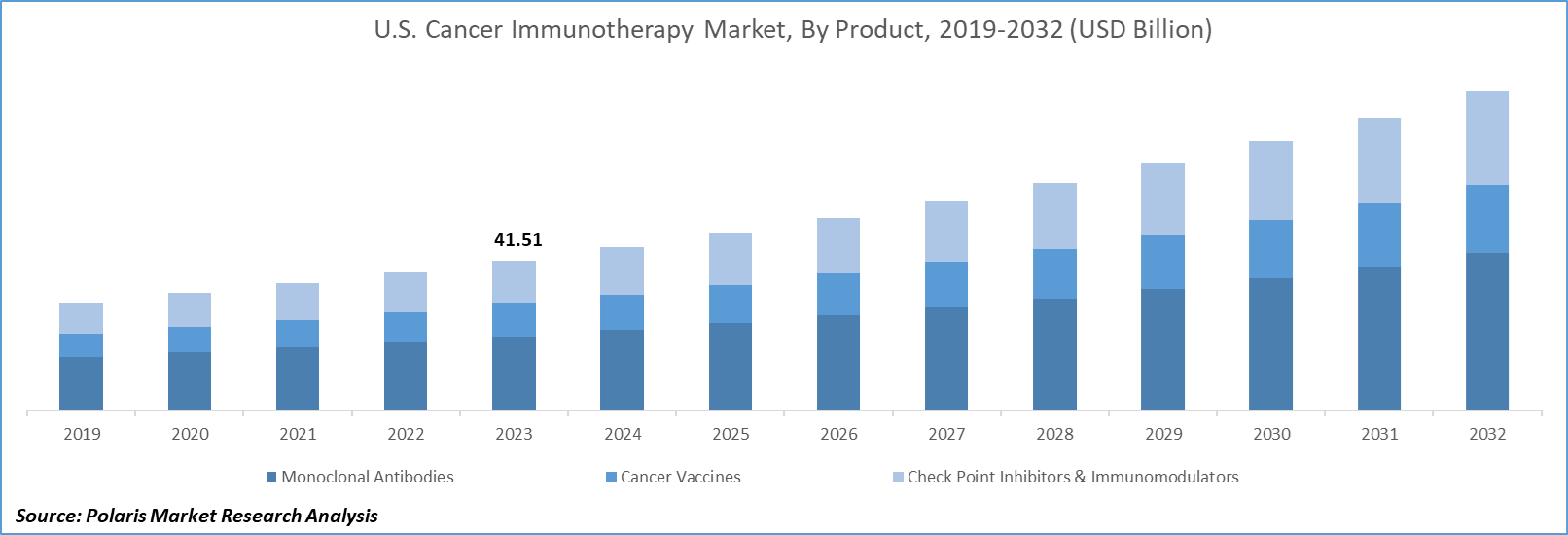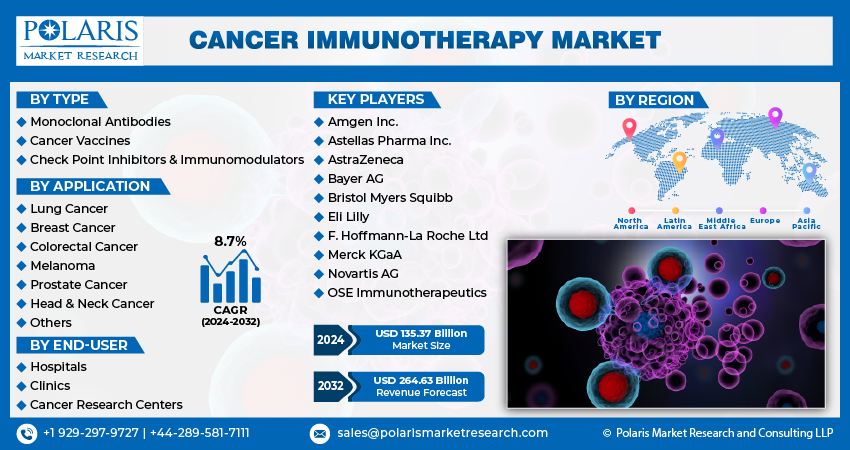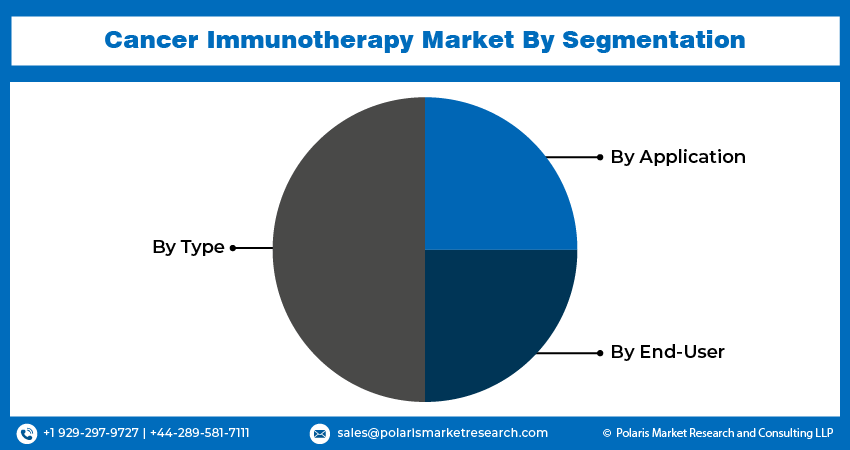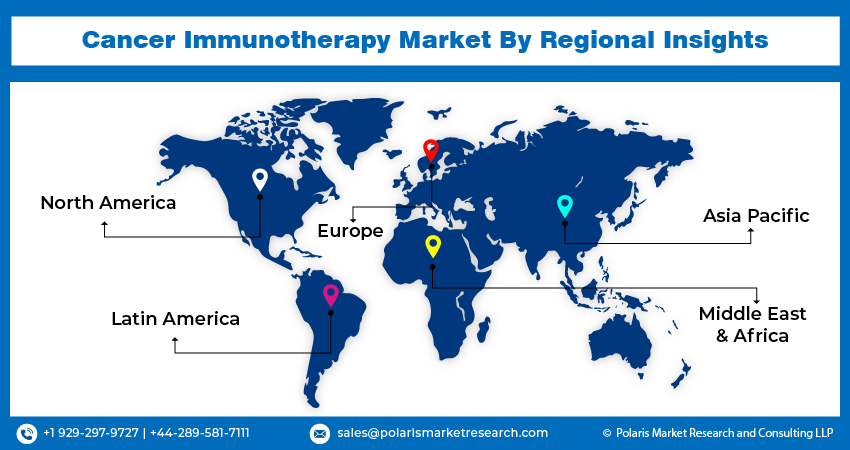
Cancer Immunotherapy Market Share, Size, Trends, Industry Analysis Report,
By Type (Monoclonal Antibodies, Cancer Vaccines, Check Point Inhibitors & Immunomodulators); By Application; By End-User; By Region; Segment Forecast, 2024 - 2032
- Published Date:Jun-2024
- Pages: 118
- Format: PDF
- Report ID: PM1652
- Base Year: 2023
- Historical Data: 2019-2022
Report Outlook
Cancer immunotherapy market size was valued at USD 124.70 billion in 2023. The market is anticipated to grow from USD 135.37 billion in 2024 to USD 264.63 billion by 2032, exhibiting the CAGR of 8.7% during the forecast period.
Industry Trends
Immunotherapies are biotherapy, also known as biologic therapy or biological response modifier (BRM) therapy. They use substances from living organisms to combat illness. Certain Immunotherapy treatments utilize genetic engineering to boost the cancer-fighting abilities of immune cells, which can be referred to as gene therapies. The purpose of Immunotherapy drugs is to enhance the immune cells' ability to fight cancer, thereby providing the immune system with an advantage. Immunotherapy has been an effective treatment for patients with certain types of cancer resistant to chemotherapy and radiation treatment.

To Understand More About this Research:Request a Free Sample Report
The increasing incidence of cancer is a major factor in the growth of the cancer Immunotherapy market. Moreover, the expanding effectiveness and accuracy of newer therapies, the rising adoption of target therapy over traditional medicine, and increasing R&D activities for new drug development collectively influence the market growth. As per the NCT Registry, as of September 8, 2020, over 1,000 clinical trials are currently underway worldwide in various phases of development for treating cancer with immune-based therapies. Additionally, with the ongoing development of these therapies, if trials continue to yield positive results, players can anticipate the emergence of new and effective immuno-therapies for cancer.
The cost of cancer Immunotherapy research and development poses a significant challenge for players in developing countries, making it difficult to secure sufficient funds for treatment. Implementing new innovations to enhance research also demands substantial investment. However, due to the high costs involved in cancer Immunotherapy, major companies are apprehensive about entering this market as they are uncertain about potential profitability. These factors collectively act as a restraining factor on the growth of the global cancer Immunotherapy market.
Key Takeaways
- North America dominated the market and contributed over 40% market share of the cancer immunotherapy market size in 2023
- By type category, the monoclonal antibodies segment dominated the global cancer immunotherapy market size in 2023
- By end-user category, the hospitals segment is anticipated to grow with a significant CAGR over the cancer immunotherapy market forecast period
What are the market drivers driving the demand for market?
Rising prevalence of cancer patients
The rising number of cancer patients has significantly influenced the growth and expansion of the cancer Immunotherapy market. Cancer continues to be a leading cause of morbidity and mortality worldwide, with billions of new cases diagnosed each year. This increasing burden of cancer has spurred the urgent need for more effective and targeted treatment options, giving rise to the rapid development and adoption of cancer Immunotherapy.
One of the key drivers behind the growth of the cancer Immunotherapy market is the success of immune checkpoint inhibitors. These drugs have shown remarkable efficacy in various cancer types, including melanoma, lung cancer, and renal cell carcinoma. Immune checkpoint inhibitors work by blocking certain molecules on immune cells, allowing them to recognize and attack cancer cells that might otherwise evade detection. The clinical success and approval of these therapies have opened new avenues for research and investment in the field of cancer Immunotherapy.
Which factor is restraining the demand for the market?
High Treatment Cost
High treatment cost is representing a substantial challenge in the widespread adoption and accessibility of these innovative therapies. The cost of developing, manufacturing, and administering cancer immunotherapies presents obstacles for patients, healthcare providers, and healthcare systems. This factor has multifaceted implications that impact various stakeholders within the market.
Developing new cancer immunotherapies requires extensive research, ranging from early-stage discovery to preclinical and clinical trials. These stages involve substantial financial investments to identify and optimize therapeutic targets, develop suitable drug candidates, and demonstrate their safety and efficacy. The complexity of understanding the immune system's interactions with cancer cells contributes to the high cost of research. The absence of cost-effective generic alternatives limits price competition, contributing to high costs. High costs can create barriers to cancer immunotherapies, particularly for patients without adequate insurance coverage or in regions with limited healthcare resources. This limitation disproportionately affects individuals from lower socioeconomic backgrounds.

Report Segmentation
The market is primarily segmented based on type, application, end-user, and region.
|
By Type |
By Application |
By End-User |
By Region |
|
|
|
|
To Understand the Scope of this Report:Speak to Analyst
Category Wise Insights
By Type Insights
Based on type category analysis, the market has been segmented on the basis of monoclonal antibodies, cancer vaccines, and check point inhibitors & immunomodulators. In 2023, monoclonal antibodies emerged as the dominant segment in the global market because these specialized antibodies are designed to target specific molecules on either cancer cells or immune cells, facilitating the immune system's ability to recognize and combat cancer more effectively. By focusing on targeted interactions, mAbs offer a notable advantage over conventional chemotherapy, reducing harm to healthy cells and minimizing side effects.
Some of the mAbs' Applications in cancer Immunotherapy involve immune checkpoint inhibitors, a well-recognized category. These antibodies obstruct certain proteins like PD-1, PD-L1, and CTLA-4, hindering the immune response against cancer cells. This interference empowers the immune system to mount a robust defense against cancer. Additionally, mAbs are pivotal in cutting-edge Chimeric Antigen Receptor T-cell (CAR-T) therapy. By engineering a patient's T cells to express synthetic receptors (CARs) that pinpoint specific cancer cell antigens, mAbs contribute to this groundbreaking approach.
By End-User Insights
Based on end-user category analysis, the market has been segmented on the basis of hospitals, clinics, and cancer research centers. The hospitals segment is anticipated to grow with a significant CAGR in the forecasted years. Increased healthcare expenditure has directed to a rise in the use of Immunotherapy drugs in hospitals and clinics worldwide. The growing number of multispecialty hospitals reflects the efforts of various countries to enhance the quality of healthcare services for patients, resulting in increased demand for advanced solutions like cancer Immunotherapy for early cancer treatment.
The hospitals in cancer Immunotherapy market projected to maintain its dominance during the forecast period. It is due to the increased number of hospital admissions related to cancer treatment and the growing presence of government and private hospitals, which are the preferred choice for patients seeking treatment for various cancer types. The rising penetration of hospitals and the adoption of advanced treatment technologies are expected to fuel the segment's growth further.

Regional Insights
North America
North America accounted for a significant revenue share in the global market due to the enhanced accessibility to advanced cancer immunotherapies for patients, the presence of prominent market participants, and escalated investments in cancer immunotherapies by both governmental and non-governmental entities are pivotal factors propelling the market's advancement in North America. The region's progressively aging population is another noteworthy contributor to its market expansion, while the burgeoning presence of pharmaceutical and biotechnological firms further amplifies regional market development. The influence of well-established market leaders is decisive in propelling revenue growth. The swift uptake of immunotherapies within this region also augments the increase in market revenue. Additional forces fueling this revenue surge encompass enhancements in healthcare infrastructure, escalating healthcare expenditures, and the availability of comprehensive medical insurance, particularly in developed nations such as the U.S. and Canada.
Asia Pacific
The Asia-Pacific cancer immunotherapy market is predicted to expand significantly due to the rising incidence of cancer, government initiatives to increase public awareness of the disease, and the development of patient assistance programs (PAPs). Esophageal cancers, Lung, colorectum, stomach, liver, and are the most common in Asia-Pacific. For example, a study titled "Burden of Cancers in India - Estimates of Cancer Incidence for 2021 and 2025 based on the National Cancer Registry Program" forecast that the region will see 26.7 billion new cancer cases in 2021. That number would rise to 29.8 billion in 2025. As a result of the increased incidence of cancer, the market will grow throughout the forecast period.

Competitive Landscape
The market showcases a vibrant and competitive landscape, driven by the critical need for more effective cancer treatments and the remarkable potential of immunotherapy in combating various cancer types. Key players dominate the market with their extensive portfolios of immunotherapeutic drugs. Additionally, biotechnology companies are actively investing in research and development to bring innovative immunotherapies to market.
Some of the major players operating in the global market include:
- Amgen Inc.
- Astellas Pharma Inc.
- AstraZeneca
- Bayer AG
- Bristol Myers Squibb
- Eli Lilly
- F. Hoffmann-La Roche Ltd
- Merck KGaA
- Novartis AG
- OSE Immunotherapeutics
Recent Developments
- In July 2023, Bristol Myers Squibb's Opdivo (nivolumab) received positive CHMP opinion for adjuvant treatment in completely resected stage IIB or IIC melanoma, potentially becoming the sole PD-1 inhibitor approved across stages IIB to IV; European Commission to review.
- In April 2023, Astellas Pharma Inc. announced that the U.S. FDA had approved PADCEV (enfortumab vedotin-ejfv) in combination with KEYTRUDA (pembrolizumab). This approval applies to the United States and is intended to treat adult patients with locally advanced or metastatic urothelial cancer (la/mUC).
- In February 2023, Novartis and Dawn Health partnered to create a platform for managing chronic conditions. This collaboration aims to establish remote monitoring tools and digital services for multiple sclerosis, hypertension, cardiovascular disease, and breast cancer, incorporating patient apps, symptom tracking, virtual clinics, and disease-specific support.
- In March 2022, Eli Lilly and Innovent enhance oncology partnership to develop impactful medicines for Chinese patients, leveraging respective strengths in a mutually beneficial collaboration.
Report Coverage
The cancer immunotherapy market report emphasizes on key regions across the globe to provide better understanding of the product to the users. Also, the report provides market insights into recent developments, trends and analyzes the technologies that are gaining traction around the globe. Furthermore, the report covers in-depth qualitative analysis pertaining to various paradigm shifts associated with the transformation of these solutions.
The report provides detailed analysis of the market while focusing on various key aspects such as competitive analysis, type, application, end-user, and their futuristic growth opportunities.
Cancer Immunotherapy Market Report Scope
|
Report Attributes |
Details |
|
Market size value in 2024 |
USD 135.37 billion |
|
Revenue forecast in 2032 |
USD 264.63 billion |
|
CAGR |
8.7% from 2024 – 2032 |
|
Base year |
2023 |
|
Historical data |
2019 – 2022 |
|
Forecast period |
2024 – 2032 |
|
Quantitative units |
Revenue in USD billion and CAGR from 2024 to 2032 |
|
Segments covered |
By Type, By Application, By End-User, By Region |
|
Regional scope |
North America, Europe, Asia Pacific, Latin America; Middle East & Africa |
|
Customization |
Report customization as per your requirements with respect to countries, region and segmentation. |
